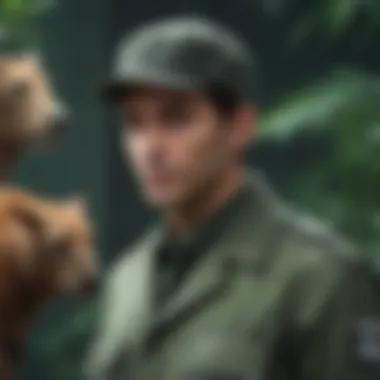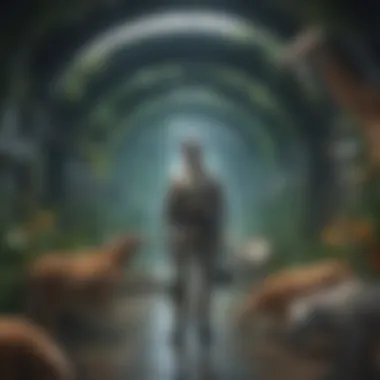Unveiling the Enigmatic Role of a Zookeeper in Kafka's Literary Universe


Overview: Role of a Zookeeper in Kafka's Works
This article delves into the intriguing depiction of a zookeeper in the works of Franz Kafka. It comprehensively examines the nuanced portrayal of zookeepers in Kafka's literature and their symbolic significance, shedding light on the deeper philosophical themes within his writings.
Franz Kafka, the enigmatic literary figure, is renowned for his unique exploration of existential themes through his works. The portrayal of zookeepers in Kafka's writings transcends mere caretaking responsibilities, reflecting deeper symbolic connotations and philosophical underpinnings. By dissecting the role of zookeepers in Kafka's universe, one can unravel the complex layers of meaning and existential dilemmas that permeate his literature.
Context and Significance of Zookeepers in Kafka's Works
In Kafka's narratives, zookeepers serve as metaphorical manifestations of societal control, existential angst, and the intricate power dynamics that govern human existence. They symbolize authority figures who wield influence over both captive animals and individuals, mirroring the oppressive systems and structures prevalent in Kafkaesque societies. By examining the multifaceted nature of zookeepers in Kafka's works, we can uncover a profound exploration of human nature, identity, and agency within the confines of a complex and surreal world.
Analyzing Symbolism and Themes
The portrayal of zookeepers as symbolic archetypes encapsulates themes of confinement, alienation, and the struggle for autonomy in Kafka's narratives. Through their interactions with animals and protagonists, zookeepers embody the tension between captivity and freedom, order and chaos, highlighting the existential quandaries faced by Kafka's characters. By studying the symbolic significance of zookeepers in Kafka's works, we can delve into the existential angst, absurdity, and profound philosophical questions that define his uniquely introspective literary landscape.
Interpretive Perspectives and Critical Insights
Critics and scholars have long debated the allegorical significance of zookeepers in Kafka's oeuvre, offering diverse interpretive lenses to analyze their impact on narrative development and thematic coherence. By synthesizing critical perspectives and scholarly insights, we can gain a deeper understanding of the role of zookeepers as catalysts for existential reflection, societal critique, and philosophical inquiry in Kafka's works. Through a comprehensive analysis of interpretive frameworks and critical discourse, we can illuminate the rich tapestry of meaning woven into Kafka's complex literary fabric.
Conclusion: Unveiling the Enigma
Introduction
In delving into the intriguing depiction of a zookeeper in the works of Franz Kafka, we embark on a journey that uncovers the subtle yet profound layers of symbolism within his literature. The role of a zookeeper serves as a linchpin in understanding Kafka's complex themes and narratives. Through a meticulous analysis of zookeeper characters across various works, we unravel the underlying philosophical underpinnings that Kafka masterfully weaves into his storytelling.


Brief Overview of Franz Kafka
Franz Kafka, a seminal figure in the realm of modernist literature, sculpted a unique literary landscape characterized by existential dread, alienation, and absurdism. Born in Prague in 1883, Kafka's works explore the intricacies of human existence and societal constructs. His narrative style, marked by surreal and dream-like elements, challenges the boundaries of conventional storytelling, inviting readers into a realm of ambiguity and introspection.
Introduction to the Concept of a Zookeeper
The figure of a zookeeper in Kafka's works stands as a metaphorical embodiment of power, control, and confinement. This symbol extends beyond its literal representation, delving into the realms of captivity, authority, and the human condition. By introducing readers to the concept of a zookeeper, Kafka sets the stage for a profound exploration of identity, agency, and the existential dilemmas that pervade his narratives. The zookeeper serves as a nexus point where themes of captivity, freedom, and the struggle for autonomy intersect, inviting readers to reflect on their own place within the confines of a seemingly orderly world.
Zookeeper as a Symbol in Kafka's Works
In the realm of Franz Kafka's literary landscape, the depiction of zookeepers emerges as a symbolic cornerstone, enriching his narratives with layers of metaphorical complexity. Capturing the essence of confinement, control, and societal roles, zookeepers in Kafka's works serve as allegorical figures that transcend mere caretaking duties. Their presence underscores themes of power dynamics, alienation, and existential unease, provoking introspection and philosophical pondering for the discerning reader. By dissecting the nuanced portrayals of zookeepers across Kafka's repertoire, we unravel a tapestry of symbolic significance that sheds light on the deeper undercurrents of his diverse narratives.
Analysis of Zookeeper Characters
The Metamorphosis
In 'The Metamorphosis,' the character of the zookeeper plays a pivotal role in mirroring the protagonist's transformed state. Through the lens of a zookeeper, Kafka delves into the interconnectedness between human and animal realms, blurring the lines of identity and confinement. The presence of the zookeeper symbolizes a sense of captivity and surveillance, highlighting the protagonist's alienation from both self and society. This choice by Kafka adds a layer of intricate symbolism to 'The Metamorphosis,' deepening our understanding of existential themes and the fragility of human existence within a mechanized world.
A Report to an Academy
In 'A Report to an Academy,' the zookeeper character embodies adaptability and assimilation, echoing themes of societal expectations and the compromises individuals make for acceptance. Through the articulate narration of the ape-turned-speaker, Kafka explores the boundaries between freedom and captivity, civilization and primal instincts. The zookeeper archetype here serves as a conduit for introspection on the performative nature of identity and the sacrifices made to navigate societal norms. This resonant portrayal adds a unique dimension to Kafka's exploration of existential dilemmas and the quest for autonomy amidst imposed constraints.
A Hunger Artist


Within 'A Hunger Artist,' the zookeeper emerges as a figure of authority and spectacle, orchestrating the public display of fasting as an art form. Here, Kafka juxtaposes the self-imposed captivity of the hunger artist with the external control exerted by the zookeeper, framing a poignant commentary on performance, validation, and the transient nature of admiration. The zookeeper's role as a facilitator of the hunger artist's exhibition symbolizes the interplay between societal expectations and individual aspirations, inviting contemplation on the illusion of freedom within confined spaces. Kafka's nuanced portrayal deepens our exploration of identity struggles, the pursuit of authenticity, and the harsh realities of public perception.
Existential Themes and Zookeeper Archetype
To dissect the core of Franz Kafka’s narrative tapestry, one must navigate the labyrinthine corridors of existential themes interwoven with the archetype of a zookeeper. This section serves as a philosophical compass, guiding readers through the enigmatic landscapes of Kafka’s prose. By unraveling the existential depths within the zookeeper archetype, we illuminate the profound introspections that Kafka orchestrates in his narratives.
Existentialism in Kafka's Writing
Kafka’s pen, a maestro’s baton conducting existential symphonies, plunges readers into the murky waters of human existence. Through his writing, existential themes pulsate boldly, questioning the very essence of being. Kafka’s exploration of existentialism transcends literary boundaries, inviting readers to introspect on the intricacies of life’s absurdities and uncertainties. His existential musings morph the ordinary into the extraordinary, exuding a sense of metaphysical urgency that lingers within the reader’s subconscious.
Zookeeper as an Existential Figure
Within Kafka’s literary menagerie, the zookeeper emerges as a cryptic figure embodying existential quandaries. The zookeeper's role transcends mere animal caretaking; instead, it symbolizes a perpetual oscillation between order and chaos, control and rebellion. Through the lens of existentialism, the zookeeper becomes a metaphor for human struggle, grappling with the confines of societal norms and personal autonomy. Kafka paints the zookeeper as a mirror reflecting the existential angst inherent in the human condition, beckoning readers to confront their own existential dilemmas.
Interplay of Identity and Captivity
At the intersection of identity and captivity lies the heart of Kafka’s thematic inquiry. The zookeeper, bound by duty and societal expectations, mirrors the entrapment of human identity within societal constructs. The interplay between identity and captivity resonates with Kafka’s larger existential narrative, highlighting the struggle for self-definition amidst a world of constraints. Through the zookeeper’s plight, Kafka weaves a tapestry of existential inquiry, urging readers to ponder the fluidity of identity amidst the rigid cages of societal conventions.
Psychological Perspectives on Zookeeper Characters
In delving into the intricate world of Kafka's writings, exploring the role of the zookeeper characters from a psychological viewpoint unveils layers of symbolism and complexity. Understanding the psychological perspectives on zookeeper characters is crucial for unraveling the deeper themes and motives within Kafka's works. The psyche of these zookeepers serves as a mirror reflecting the inner turmoil prevalent in Kafka's narratives, providing insight into the characters' motivations and struggles. By analyzing the zookeepers through different psychological lenses, readers can grasp the subtle nuances and subconscious elements that contribute to the overall thematic richness of Kafka's literature.
Freudian and Jungian Interpretations


A Freudian interpretation of zookeeper characters in Kafka's works sheds light on the unconscious desires, fears, and motivations that drive their actions. Freud's concept of the id, ego, and superego can be applied to dissect the behaviors of zookeepers, revealing hidden drives and conflicts shaping their personalities. Conversely, Jungian interpretations emphasize the collective unconscious and archetypes present in zookeeper characters, exploring universal symbols and motifs that resonate with readers on a profound level. By delving into Freudian and Jungian perspectives, readers can unravel the depths of the character's psyches, gaining a deeper appreciation for the complexities of Kafka's storytelling.
Zookeepers as Manifestations of Internal Struggles
Zookeepers in Kafka's works often serve as representations of internal struggles and existential dilemmas faced by individuals. These characters embody the conflict between societal expectations and personal desires, trapping themselves within figurative cages of conformity and repression. The zookeeper's struggle mirrors Kafka's own internal battles with identity, autonomy, and belonging, inviting readers to contemplate their own inner conflicts and struggles. Viewing zookeepers as manifestations of internal struggles allows readers to empathize with the characters' predicaments and immerse themselves in the psychological depth of Kafka's narratives.
Conclusion
In this conclusive section of the article, we unravel the essential takeaways from our deep dive into Kafka's depiction of zookeepers. The significance of the zookeeper motif in Kafka's works goes beyond a mere portrayal; it serves as a lens through which to examine existential themes, psychological undercurrents, and societal constructs. By dissecting this archetype, we unearth layers of symbolism and metaphorical depth that illuminate Kafka's profound philosophical musings.
The role of the zookeeper in Kafka's works serves as a poignant reflection of the human condition, encapsulating themes of alienation, identity crisis, and the struggle for autonomy. Through the zookeeper characters in 'The Metamorphosis,' 'A Report to an Academy,' and 'A Hunger Artist,' Kafka invites readers to ponder on the complex interplay between individual agency and external expectations. This exploration expands our understanding of Kafka's narratives and offers a gateway to delve deeper into the existential quandaries that permeate his literary landscape.
As we navigate through Kafka's intricate portrayal of zookeepers, we are confronted with the juxtaposition of freedom and captivity, self-realization and societal constraints. The zookeeper archetype acts as a mirror reflecting the inherent struggles and conflicts embedded within the human psyche. Through Kafka's nuanced lens, we grapple with questions of authenticity, belonging, and the innate desires that drive us towards self-assertion.
The zookeeper motif not only enriches Kafka's narratives with allegorical depth but also prompts introspectionthe mark left behind by these characters extends beyond the confines of his stories, lingering in the minds of readers long after the final page is turned.
Key Takeaways on the Zookeeper Motif
The exploration of the zookeeper motif in Kafka's works reveals a tapestry of interconnected themes and profound reflections on the human condition. One key takeaway is the symbolic duality of the zookeeper as both caretaker and captor, symbolizing the paradoxical nature of power and control. Additionally, the zookeeper serves as a representation of societal norms and expectations, highlighting the struggles of individuals against oppressive systems.
Another crucial insight gleaned from Kafka's zookeeper characters is the theme of isolation and estrangementThus, the zookeeper motif emerges as a metaphor for the inherent tension between conformity and rebellion, encapsulating the universal struggle for autonomy and self-definition.
Final Thoughts on Kafka's Zookeeper Archetype
In the final analysis of Kafka's zookeeper archetype, we are left with a profound sense of introspection and inquiry into the complexities of human existence. The zookeeper, in all its symbolic richness, transcends mere literary device to become a vessel for exploring the depths of consciousness and the frailty of human agency.
Kafka's portrayal of zookeepers invites readers to contemplate the intricacies of power dynamics, existential angst, and the quest for meaning in a world imbued with absurdity. Through this lens, the zookeeper archetype in Kafka's works echoes a timeless narrative of struggle and search for autonomy in a universe fraught with ambiguity and enigma.
As we bid farewell to Kafka's zookeepers, we carry with us the lasting impact of their symbolic presence, a reminder of the perennial quest for identity, freedom, and self-determination in the face of inexorable external forces.



